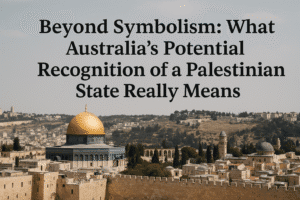Beyond Symbolism: What Australia’s Potential Recognition of a Palestinian State Really Means
Australia’s potential recognition of a Palestinian state reflects growing global impatience with Israel’s actions and the stalled peace process. While symbolically powerful, signalling a shift in international dynamics and pressuring allies like the US, its immediate practical impact is limited. Recognition grants Palestine diplomatic rights within Australia and strengthens its legal standing, but it won’t end the occupation, lift the Gaza blockade, or alleviate the immediate humanitarian crisis where starvation persists.
Experts stress it offers crucial hope and a foundation for future recovery and self-determination, acting as a catalyst to revive the two-state solution. However, full sovereignty and UN membership remain blocked without Security Council approval. The move sparks debate: proponents see it as necessary to break diplomatic inertia, while opponents argue it must follow a finalized peace agreement and Hamas’s dismantling. Ultimately, recognition addresses long-term political rights but does not solve Gaza’s dire, immediate suffering.

Beyond Symbolism: What Australia’s Potential Recognition of a Palestinian State Really Means
The Albanese government’s shift towards recognising Palestinian statehood isn’t just diplomatic posturing – it’s a significant marker of growing global frustration with the status quo and a potential catalyst for change, albeit with complex realities on the ground.
Why Now? The Tide of International Impatience
As UN Special Rapporteur Ben Saul starkly observes, the mounting pressure stems from “two years of international law violations by Israel.” Professor Shahram Akbarzadeh (Deakin University) describes a shift from post-October 7th sympathy for Israel to “international sense of disbelief” at its conduct in Gaza, citing the blockade and deprivation of essentials. This disillusionment has spurred nations like the UK, France, Ireland, Norway, and Spain to formally recognise Palestine, with Canada recently announcing plans to do so in September. Australia’s recent vote affirming Palestinian sovereignty over natural resources, breaking a two-decade abstention streak, signals this evolving stance. The government now frames recognition as “a question of when, not if,” though tied to preconditions like Hamas demilitarisation and hostage release.
What Recognition Actually Means (And What It Doesn’t)
Recognition is powerful, but its immediate practical impact is nuanced:
- Diplomatic & Legal Shifts: As Ben Saul explains, recognition grants Palestine rights under Australian domestic law: diplomatic immunities for officials and the ability to establish full formal diplomatic relations. It elevates Palestine’s standing in bilateral dealings.
- A Powerful Symbol & Geopolitical Nudge: Akbarzadeh sees the core value as a “strong message to the United States that the global dynamic is changing.” It pressures the US to leverage its influence over Israel towards a viable two-state solution, challenging the current diplomatic stalemate reinforced by the US’s recent UN veto on Palestinian membership.
- The UN Hurdle: Crucially, both experts agree the most significant practical benefits – like full UN membership, undisputed legal sovereignty to bring international claims, or unhindered control over borders and resources – remain blocked without UN Security Council approval, where the US veto looms large. Akbarzadeh notes that “the reality of power overrides the legality” until this changes.
- Not an Immediate Panacea for Gaza: Both Saul and Akbarzadeh are unequivocal: recognition alone does not end the humanitarian catastrophe in Gaza. “The impact on the daily life of Gazans is nothing because Gaza is still under military occupation and blockaded by Israel,” states Akbarzadeh. Ending starvation and enabling reconstruction requires Israel allowing unfettered aid flow and lifting the blockade. Recognition offers “prospects for future recovery,” a pathway to self-determination, and crucially, “hope,” but not immediate food or medicine.
The Core Contention: Process vs. Catalyst
The debate crystallises around when recognition should occur:
- The Government & Experts’ View: Recognition is a necessary catalyst to break the deadlock, affirm Palestinian rights under international law, and pressure Israel towards negotiations. Waiting indefinitely for a perfect final peace agreement, they argue, has only enabled the occupation’s entrenchment.
- The Opposition’s View (Coalition): Angus Taylor argues recognition must come only at the end of a successful peace process, after Hamas is dismantled and hostages freed. They see premature recognition as “putting the cart before the horse,” potentially rewarding violence and undermining Israel’s security.
The Human Cost: The Stark Reality Behind the Diplomacy
Amidst the political manoeuvring, the horrific reality in Gaza remains the urgent moral imperative. Reports of severe malnutrition, like the case of two-year-old Yazan Abu Foul, contradict Israeli denials and highlight the blockade’s devastating impact. Saul stresses that beyond recognition, countries like Australia and key allies (US, Germany) have binding obligations under international law: “not to transfer weapons or ammunition to a country that would use them to commit war crimes.” Addressing Gaza’s suffering requires immediate, concrete action on aid access, independent of the statehood recognition timeline.
The Path Ahead
Australia’s signature on a joint 15-nation statement committing to a Palestinian statehood pathway, including demands for Hamas disarmament and Palestinian elections, shows intent. Recognition is increasingly seen not just as a symbolic gesture, but as a strategic diplomatic tool to reshape a failing dynamic.
While it won’t instantly free Gaza or resolve final borders, it represents a fundamental assertion of Palestinian rights and a significant step towards holding the current course accountable. It signals that the international community’s patience with the endless cycle of violence and occupation is wearing thin, demanding a tangible move towards a future where two states, living side-by-side in peace, is more than just a distant aspiration. The true test, however, remains translating diplomatic shifts into concrete improvements for Palestinians enduring unimaginable hardship today.
You must be logged in to post a comment.